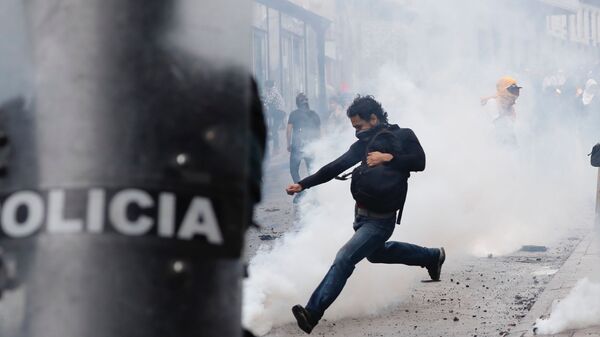Ecuadorian President Lenin Moreno declared a state of emergency in the country on Thursday amid nationwide protests which have paralysed much of the Latin American country's transport infrastructure, saying that his decisions to introduce austerity measures and slash subsidies "were firm," and that the state of emergency was aimed at reigning in "those who intend to cause chaos."
"We will not agree to blackmail and act according to the law," Moreno wrote on his official Twitter account.
Las decisiones adoptadas ¡están en firme! He dispuesto el Estado de Excepción para precautelar el orden, la seguridad ciudadana y con el fin de controlar a quienes pretenden provocar caos. No accederemos a chantajes y actuaremos acorde a la ley. #NoAlParo #DecididosACrecer pic.twitter.com/sLVyIljQ7Y
— Lenín Moreno (@Lenin) October 3, 2019
Moreno announced the state of emergency after Interior Minister Maria Romo said that 19 protesters had been arrested for blocking roads and for other disruptive behaviour as demonstrators took to the streets, chanting slogans and burning tires, marking their anger over the elimination of long-standing fuel subsidies worth over $1.3 billion a year. Ecuador's government announced plans to cut the subsidies as part of a broader austerity plan which also includes mass layoffs of employees from state-owned companies, and plans to privatise CNT, a state-owned telecommunications provider, and other firms, while making changes to the tax code.
Moreno signed a decree on ending diesel and gasoline subsidies on Tuesday in order to comply with the loan conditions of the International Monetary Fund, which has offered Ecuador a $4.2 billion loan package in exchange for the adoption of a series of reforms, including the end of subsidies, changes to the tax code, and privatisation.
#BREAKING #Ecuador declares state of emergency, says 19 people arrested, amid massive protests against fuel subsidy cuts pic.twitter.com/wrArnBBbXn
— Guy Elster (@guyelster) October 3, 2019
#Ecuador | Public transport drivers started a nationwide strike to protest the elimination of gasoline subsidies announced by President #LeninMoreno. #InPictures pic.twitter.com/oVRKvDbcM0
— teleSUR English (@telesurenglish) October 3, 2019
Since Moreno's election in 2017, Ecuador began taking steps to normalise relations with the United States, moving away from the policy of the country's previous president, Rafael Correa, who regularly criticised alleged US interference in Latin American politics. After completing his term in office, Correa left the country amid efforts by the new authorities to have him arrested for alleged corruption. Correa has denied the allegations against him, and has claimed that the judicial proceedings against him were aimed at preventing him from returning to the country to participate in elections in 2021. Earlier this year, as part of his efforts to improve relations with Washington, Moreno agreed to have WikiLeaks founder Julian Assange expelled from the Ecuadorian Embassy in London, where he had lived since 2012, after which Assange was arrested and jailed in the UK.




